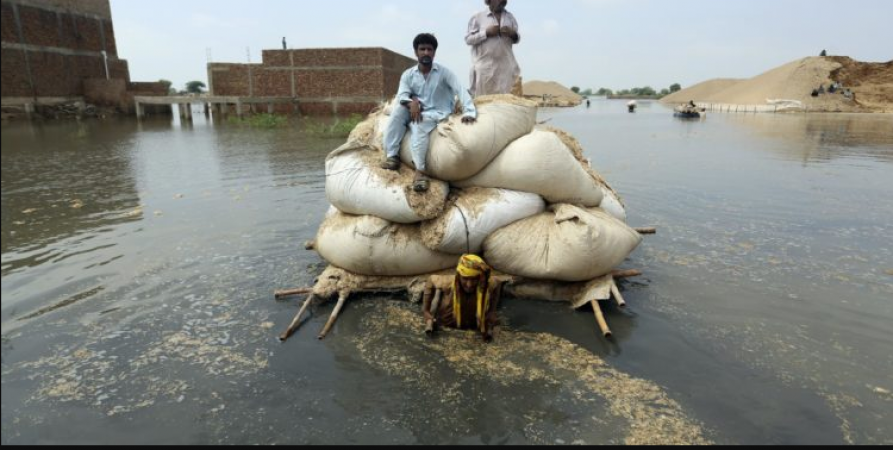
Pakistan: There are growing fears that a growing humanitarian crisis could destabilize the world's fifth most populous country as recent flood waves, which have submerged a third of Pakistan, spread to the Arabian Sea .
Politicians, analysts and Pakistan's creditors are concerned that widespread unrest in the coming months could be caused by the government's poor response to the climate disaster, which has displaced more than 33 million of the country's poorest citizens and over a million More houses have been destroyed.
According to Nusrat Javed, a journalist who works out of Islamabad, the scope of the disaster is unprecedented.
According to Javed, the Pakistani government is "not wealthy enough to care for the millions of flood victims" who will "feel politically abandoned."
He said the risk of a significant breakdown in law and order is enormous, as Pakistan works to rebuild an area the size of the United Kingdom as floods subside.
According to Javed, there may very well be small-scale rebellions, and the deterioration of public order may spread.
He claimed that "state organs have not yet envisioned the socio-economic effects of the floods" because of the Pakistani government's immediate concern to keep the country afloat.
Several flood victims who spoke in Asia last week at Dera Ghazi Khan (DGK), a farming community in the center of Pakistan near the confluence of the Indus River and several of its major tributaries, reaffirmed their concerns.
Incessant floods in DGK since July 24 have devastated villages one after the other, destroying the crops and livestock on which the cultivators depend for survival, leaving residents across the district. He claimed that he had not received any warning from the authorities.
In the 118 Pakistani districts that are currently under water, they claimed that zero attempts of mass evacuation were made.
And the little humanitarian aid it receives is scattered randomly, reaching only those who have managed to move in areas of the national highway network that are still connected to the rest of the country, according to the victims. Huh.
Asfandyar Mazari (29), a tribal chieftain from Rajanpur, a district to the south of the DGK, claimed that "the scale of the damage exceeds the compensation paid to the public."
Mazari, a poor woman, worked and saved for years to collect a dowry of 14 dresses and other things for her daughter.
According to Mazari, "his daughter was supposed to celebrate her henna ceremony," a premarital custom involving temporary body art application practiced by brides throughout South Asia.
Instead, the flood of that day came and took everything with him including his dowry.
The World Health Organization (WHO) on Thursday considered Pakistan in a "Grade 3 emergency" as tens of millions of people were living on highways and highlands without food, water, shelter or any kind of protection. from water borne and insect borne diseases.
The WHO has mobilized its country and regional offices as well as its headquarters to address the crisis in Pakistan as it is the highest level on the United Nations Organization's list of emergencies.
Politicians have warned that unless Pakistan's government and international donors act quickly, the humanitarian catastrophe will be worse in the coming months.
If the government does nothing to ensure food security, Muhammad Khan Leghari, a member of the opposition National Assembly based in Dera Ghazi Khan, warned that by the end of the year, there would be a wheat shortage across the country.
Introducing this week, he claimed that "two-and-a-half" of the three Punjab provincial assembly constituencies that fall within the boundaries of his National Assembly seat in the DGK in Asia are submerged during a tour of the flooded district.
"No other crop can be planted until the water recedes. Rice and cotton crops have been washed away," Leghari said.
He claimed that dozens of villages that were "completely destroyed" migrated from the nearby Koh-i-Sulaiman mountain range to the heavily populated Indus River areas.
Repairing the damage would require countless years, Leghari continued.
Flood victims claim that they need constant government income to support their families as their homes, crops and livestock have been destroyed or killed.
The introduction of harsh austerity measures demanded by the International Monetary Fund in recent months coincides with a flurry of measures, making it clear that it would be practically impossible for Pakistan's cash-strapped government (IMF) to do so.
The fund's financial assistance for Pakistan under the US$7 billion payment support programme, first agreed in 2019, resumed last week after being halted since March.
Thursday's update with the IMF on Pakistan's economy included a warning that future political unrest and economic instability could result from high food and fuel prices made worse by the removal of government subsidies.
However, the heavy devastation caused by the ongoing floods was not taken into account by the authors of the report.
According to Najam Ali, CEO of Next Capital, a Karachi-based financial services company, "marginalized groups, such as those living in poverty, are in a much worse position."
He added that "some of the early effects" of the floods included human casualties, loss of crops and livestock, the spread of potentially deadly diseases and widespread infrastructure destruction.
Hate from Pakistan and Mohammad Zubair immediately started batting 'anti-India'..!
From Swara Bhaskar to Pooja Bhatt Celebrities came in support of Cricketer Arshdeep Singh's support
Pakistani Actress Mehwish Hayat slammed Bollywood for silence on Pakastani Flood